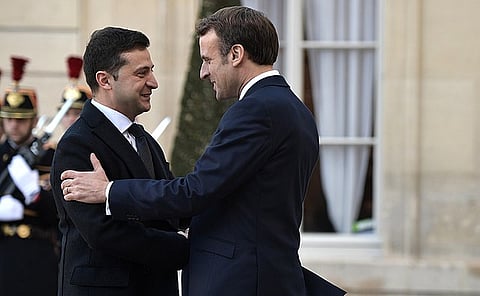

Coalition Commitments and Conditional Deployment
Twenty-six nations, primarily European members of the "coalition of the willing," have pledged to provide postwar security guarantees to Ukraine, including the deployment of an international force on land, sea, and air, French President Emmanuel Macron announced after a Paris summit. The guarantees aim to deter future aggression and reassure Kyiv once hostilities cease, though Macron emphasized deployment would occur only "the day the conflict stops". Notably, contributions vary significantly among participants: France and Britain expressed readiness to deploy troops inside Ukraine, while Germany and Italy conditioned their involvement on clearer U.S. commitments and parliamentary approvals. Italy’s Prime Minister Giorgia Meloni explicitly ruled out sending troops, offering instead to monitor ceasefires or train Ukrainian forces externally.
U.S. Ambiguity and Economic Pressure Campaign
The coalition seeks U.S. backing to ensure viability, citing America’s logistical and intelligence capabilities. While President Donald Trump expressed willingness to contribute, details remain undefined and subject to "finalization in the coming days". During a post-summit call, Trump urged European leaders to halt purchases of Russian oil and pressure China over its support for Moscow’s war efforts, highlighting ongoing economic tensions. Macron confirmed allied alignment on potential future sanctions targeting Russia’s energy sector and Chinese involvement, though Hungary and Slovakia continue resisting full energy decoupling.
Russian Diplomacy and Sovereignty Concerns
Russian President Vladimir Putin reiterated openness to negotiations "if common sense prevails," while firmly opposing NATO troop deployments in Ukraine as part of any settlement. He previously outlined demands for Ukrainian neutrality, Donbas withdrawal, and no Western military presence, conditions Kyiv rejects as "surrender". NATO Secretary General Mark Rutte dismissed Russia’s objections, asserting, "Why are we interested in what Russia thinks? It’s a sovereign country". However, the coalition’s planning acknowledges risks of provoking escalation, with European troops requiring U.S. security "backstops" against potential retaliation.
Operational Challenges and Divergent Visions
The proposed force faces logistical and political hurdles. Macron clarified that not all 26 nations would deploy inside Ukraine; some would provide training, equipment, or remote support. Poland and Romania ruled out ground troops but offered logistical aid, while Finland pledged non-combat participation. The coalition also grapples with defining missions: air patrols, Black Sea security, and cyber operations are envisioned, but troop numbers and precise roles remain unspecified. Ukrainian President Volodymyr Zelenskyy praised the commitments as "serious, very specific substance" but stressed reliance on U.S. support.
Broader Implications for Regional Stability
The security guarantees intersect with parallel diplomatic efforts. Trump’s August meeting with Putin in Alaska explored potential peace terms, including Ukrainian neutrality and territorial compromises, though Kyiv remains opposed. Rutte warned against "naiveté" toward Russia, emphasizing deterrence to prevent future aggression beyond Ukraine. Meanwhile, Russia’s expulsion of an Estonian diplomat and sustained drone attacks on Ukraine underscore ongoing tensions. The coalition’s plans reflect a long-term vision for European security, yet their implementation hinges on elusive ceasefire agreements and U.S. cooperation amid global geopolitical rivalries.